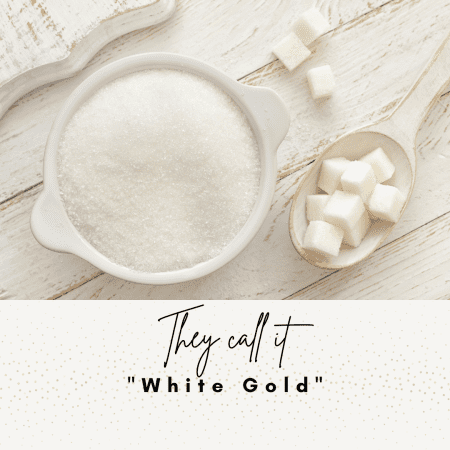 The history of sugar is a fascinating but troubling story. If you have time to do a little research, you might agree. We won’t delve into the depths of that today but I do want to speak to what happens when we consume sugar and ways you can reduce your cravings for sugar in a sustainable way for the benefit of longevity and better health.
The history of sugar is a fascinating but troubling story. If you have time to do a little research, you might agree. We won’t delve into the depths of that today but I do want to speak to what happens when we consume sugar and ways you can reduce your cravings for sugar in a sustainable way for the benefit of longevity and better health.
If you crave sugar (or foods that easily convert to sugar like bread, pasta or rice etc.), feel like you lose control with sugary foods and eventually eat more than you planned to have, you are not alone.
Did you know that the term “White Gold” is a phrase used for both sugar as well as cocaine?
They share some common reactions in the body; both have very similar effects on the brain, causing the release of the neurotransmitter dopamine as well as activating opioid receptors.
Dopamine and opioids activate the reward centers in our brains, make us feel good and provide us with quick energy, all of which cause the body to want more and more. The more we consume sugar, the more we need to reach that state of “high” we previously experienced. Essentially, we build up tolerance and crave more and more over time.
And, withdrawal is HARD!
One of the bigger issues with sugar cravings versus cocaine addiction is that sugar is available (legally) everywhere we turn. And just to make matters more complicated, food is a necessity for human survival unlike cocaine or other recreational drugs.
So, we are a society addicted to sugar, using it in the mornings to get us up and running, in the afternoons to make it through a busy day, and even in the evenings as a means to relax and enjoy our lives. It’s found in every corner of the grocery store, even in “healthy” soups and other products we wouldn’t expect to find it.
For all transparency, there are other reasons we might crave sugar, one of which is the overgrowth of organisms in the digestive tract. An in-depth look inside the microbiome via a comprehensive stool test is the best way to determine if your sugar cravings are tied to imbalances in the gut. Reach out if you are interested in learning more about this connection.
So, how do you break up with sugar in a way that doesn’t feel overly stressful and feels more like a positive than a negative?
- Start your day with plenty of protein – having a breakfast packed with plenty of protein helps stabilize blood sugar levels and curb sugar cravings throughout the day.
- Go slow – my motto with most things is “make small changes over time” – stress is real in most of our lives and trying to kick sugar in a day (or a week!) can cause even more stress which is unhealthy. Simply choose small ways to replace your favorite sugary treats with healthier options. If you want some tips, reach out!
- Keep things interesting – Sometimes we reach for sugary foods because we feel bored with food in general. Finding new and exciting recipes or recipe inspiration in cookbooks, magazines, social media or even old family favorites, can help keep food feeling fresh and interesting and in turn you feel less drawn into the quick but temporary excitement that sugar offers your brain and body.
- Have a plan and food available as often as possible. When we are hungry, we are most likely to negotiate with ourselves regarding sugar. Surround yourself with healthy snacks and easy to grab meals so that when you find yourself feeling hungry or in need of some energy, you have the right fuel to put into your body and reduce your desire for sugar.
Of course kicking the sugar habit takes time and patience so give yourself grace as you move through the process of reducing sugar in your day to day life. The more distance you put between you and refined sugar, the less inclined you are to think about it. Your taste buds change pretty quickly as well so you will (soon enough) be able to have small portions of sweet treats and not feel as triggered by them because they will seem less appealing to you overall.
Take it slow but move in the right direction and your body and mind will thank you!
Be well,
Cecili, CNTP